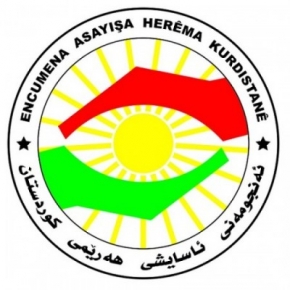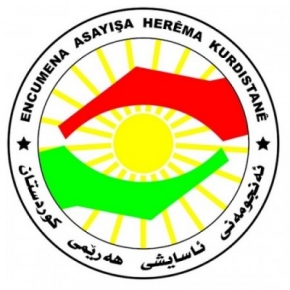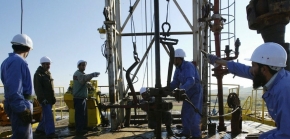Fourth major offensive in west of Kirkuk clears more than 140 square kilometres. Peshmerga Forces secure Ghara Heights, push ISIL beyond the river between Ghara Heights and Mt. Varies, and secure additional stretch of Kirkuk - Samarra highway
From 1900hrs on September 29 to 0530hrs on September 30, International Coalition warplanes targeted dozens of Islamic State in Iraq and the Levant (ISIL) positions ahead of another major ground offensive led by Peshmerga forces.
The objectives were to reach Ghara Heights, located West of Mt. Bawita, secure additional stretch of the Kirkuk-Samarra Highway, push ISIL terrorists further South of the river West of Mt. Bawita, and further diminish ISIL's ability to threaten the Kurdistan Region.
Peshmerga forces began their ground offensive at 0600hrs. By 1400hrs, they reached and controlled Ghara Heights. This strategic position overlooks several villages South of Mt. Batiwa still controlled by ISIL terrorists. Today's advance has pushed ISIL terrorists further South of the river, further diminishing ISIL's ability to attack Peshmerga forces and putting additional pressure on ISIL in Hawija.
The offensive, launched from three fronts West of Kirkuk, included approximately 3,500 Peshmerga. More than 140 square kilometres were cleared, including the following areas: Meziriya, Gubebe, Seda, Mohammed Khalil, Qows Kurd, Tl Werd, Khelef and Mansuriya.
During the offensive ISIL terrorists were seeing fleeing the battlefield towards Hawija and surrounding areas.
International Coalition warplanes targeted 30 ISIL positions during the ground offensive, including three Humvees, three pick-up trucks and 1 VBIED. At least 40 ISIL terrorists were killed.
This is the fourth major ground offensive near Kirkuk since March 2015, clearing more than 670 square kilometres.
Office of The Chancellor
Kurdistan Region Security Council (KRSC)
At 0530hrs on September 11, Peshmerga forces launched a large-scale offensive in South of Kirkuk to further weaken ISIL's ability to threaten the Kurdistan Region. By 1315hrs, over 150 square kilometres were reclaimed, including the following villages: Albu Mohammed, Albu Yusif, Smud, Dlati Bchuk, Dlati Gowra, Sab'nisan, Tl Raba', Zenqare and Gm Bus.
During the offensive, Peshmerga forces successfully took control of the strategic Dusera Heights, located South of Daquq, and an additional stretch of the Kirkuk-Baghdad Highway, further limiting ISIL's freedom of movements.
International Coalition warplanes targeted dozens of ISIL positions from early hours of the morning and provided close air support to Peshmerga forces. The offensive, which was launched from two fronts South of Daquq, included approximately 1,500 Peshmerga and resulted in killing at least 40 ISIL terrorists.
One VBIED was destroyed by an International Coalition airstrike.
Counter-IED teams are now clearing the heavily-mined area.
In the last six months more than 530 square kilometres South of Kirkuk have been cleared as a result of four large-scale offensives.
Office of The Chancellor
Kurdistan Region Security Council (KRSC)
Erbil, Kurdistan Region, Iraq (cabinet.gov.krd) - According to the April 2015 report published by the Kurdistan Regional Government, KRG, Ministry of Natural Resources, KRG commitments under the 2015 Federal Budget Law have been met, and oil production has reached record levels.
According to an agreement on oil export and budget, reached last December between the KRG and the Federal Government of Iraq, Kurdistan Region is committed to export 550,000 bpd (barrels per day) in return for a budget entitlement close to one billion US dollars per month to be paid by the federal government. The agreement was approved within the framework of the Iraqi Federal Budget Law for 2015.
In April, the Kurdistan Regional Government delivered to the Iraqi State Oil Marketing Company, SOMO, a total 16,878,985 barrels for an average of 562,633 bpd.
Kurdistan Region oilfields supplied 12,457,371 barrels averaging 415,246 bpd, while North Oil Company (NOC) oilfields, Kirkuk, supplied 4,421,614 barrels averaging 147,387 bpd. Oil from both sources is exported through a KRG pipeline to the Turkish oil export facility at Ceyhan.
In March the KRG published cumulative export data, noting that while it met its oil export commitments, the KRG has yet to receive its full entitlement per agreement under the Federal Budget Law of 2015.
Last week, in two separate meetings, the Kurdistan Region Prime Minister and a number of members of the Council of Ministers, met Kurdistan Region Baghdad representatives, and the Speaker of the Kurdistan Parliament along with Parliamentary groups.
The Prime Minister reaffirmed KRG’s commitment to the December agreement and the Iraqi 2015 Federal Budget Law. He pointed out, however, that if talks with Baghdad do not produce positive results and Baghdad continues its breach of the Federal Budget Law, then the KRG will have to consider other options to stabilise the Region’s financial security.
Nazem Dabbagh, the representative of Kurdistan Regional Government of Iraq in Iran, in a note deals with the emergence and growth of ISIS. In his view ISIS is generated through strategic competence between the east and west. When Marxism and Liberalism were competing the Soviet Union attack Afghanistan which caused Islamic groups form universal groups. In this atmosphere Osama Bin Laden appeared and Wahhabi groups came to power in Afghanistan. The peak of their power was the terrorist attack to twin global trade towers. As America attack Iraq the Ba’ath began to oppose new Iraq. Some of them headed Syria government and it also employed them in order to accomplish their goals.
Dabbagh believes that the wrong political management in Iraq caused till Ba’ath and Wahhabi groups have grown so that the weaknesses of the central government to give serves to Sunni regions brought up oppositions of the people for times. Through these opposition Salafists took more advantages than others and absorbed many groups.
In Syria employing individual policies and the actions of domestic opponents such as Ekhvanis and Salafis in Homs as well as Kurds whose its identity has not been taken for granted for many years, follows a wave of oppositions against Assad’s government. Following the occurred vacuum Takfiri groups took the most advantages and took more areas under their control. In these conditions Al-Qaeda of Iraq and former Ba’aths dispatched their supporters and concentrated their actions toward Syria and unified with the Arab opponents and put Kurds aside. After endless support for the Groups called opposition of Syria all these came to a great power in a way. Then it got clear that Salafi-takfiri separated from this frame and Syria free army began to weaken and the Al-Qaeda of Iraq and Ba’ath became more powerful and could take the control of the game field of Syria. After coming to power Salafis, Takfiris and a part of Syrian Ekhvan got unified and incorporated Islamic government of Iraq and Syria (ISIS).
ISIS plans is to incorporate Islamic government, to reject other ideas and ideologies and to announce others as infidel, to turn to terrorist actions and massacre the opponents. They advanced so fast that they could spread their actions to Iraq like Mosul, Tikrit and a part of Samarra, Kirkuk and Diyaleh and united many regions to Fallujah and Al-Anbar. The reason of their success was first the disability of Iraq army and Maleki who surely formed the army with the remains of Ba’ath. For this within a couple of hours nearly 100,000 Iraqi soldiers ran away and the region was under ISIS control but those regions protected by Pishmerga troops.
Of course based on history the union of Ba’aths, Al-Qaeda, Salafi and Takfiri can be referred to Islamism school which since the corporation Ba’ath believed the unification of Syria, Iraq and Egypt, and even now after many years as the condition being prepared they tend to form Islamic government and to survive Islamic caliphate accordance with their thought and plan.
ISIS is generated by who hated unified Iraq and powerful Kurds and Shia and thought of taking revenge; and at last began to attack and spread the borders under their control that I personally already in several interviews mentioned this that ISIS would attack Kurdistan and finally they did so.
In talk with Arman Press, Nazem Dabbagh depicted aspects of ISIS attack to Mosul and some other areas of Iraq turning to the most important news of Iraq these days. ISIS could overwhelm Mosul as well as Kirkuk and Tikrik, he said.
In his view Iraq forces’ spirit has got weakened but Pishmergas could free some parts of Kirkuk. In addition he mentioned Mr. Maliki’s phrase, the prime minister of Iraq, having said in a few days ISIS would be evicted from occupied lands.
Namely, some of the political groups for drawing votes of Ba’aths and their supporters promised to cooperate with them. He believed he would have to avoid giving important jobs to Ba’aths. He had documents proving some Ba’aths were used to attack Tikrit along with terrorists those who formed Anfal operation (genocide of Kurds) he said.
Nazem Dabbagh rejected the news about not being accepted of refugees of Mosul by KRG and added the prime minister of KRG, Mr. Nechirvan Barzani, frankly asked region authorities to give hand to them. He continued to say that Pishmergas are able to run operations against ISIS; therefore their being engaged to this quarrel is required general commander’s and KRG’s agreement. The close partnership between people and Iraq security forces against any threats is vital he believed.
Dabbagh put the possibility of ISIS attack to Baghdad under doubt and said did Baghdad fall, the whole country would. This is dangerous for Kurds since the next goal is Kurdish region and the region as whole. He quoted Mr. Talibani’s view saying the moment ISIS got formed in Syria it should have treated there and would not be allowed to be widespread.
In a response to a question he said Mr. Maliki asked America, to this purpose 4000 American forces entered Iraq.
Dabbagh put two strategies as solutions to ISIS. First is the formation of the real government of Iraq with presence of the majority of Iraqi groups. In this direction, he cautioned taking advantage of military forces of Iraq and Pishmergas in special having fighting background. The second strategy was is to establish an Iraqi identity for all groups, tribes and races, so that each Iraqi knows himself Iraqi first
of all. He claimed, if not so, again we would return to the previous government.
Continuing his talk he considered ISIS as a danger not only for Iran, but also for its fans Arabia and Turkey and even Europe. He even mentioned Iraq as a country suffering lots of problem and said reaching a unanimous agreement among Iraqi political groups was the concern neglected coalition of legal government governing. In his view Maliki did not manage to appeal all groups’ participations.
Dabbagh continued to say his predictions about Iraq were met and presently he is to predict that Iraq may change to another Afghanistan. In a response to a question he said if Kurds and other groups do not share affairs, the race identity will raise and if so ISIS would overcome Sunni sections, I say it is none of my business for I am Kurdish. In an answer to a question he said the solution to react ISIS is the unity among all groups and it is necessary to respect everybody’s right.
He mentioned the process of Erbil protocol formation according which the responsibility of prime ministry and general commander was taken on Mr. Maliki. Therefore in his view Maliki did not take any action to solve the problems of country. Frankly he asked federal government to respect Kurds rights so that they remain as a part of the country and accept the responsibility for its problems.
Latest News
- President Nechirvan Barzani in Vienna: Austria aims to enhance diplomatic and trade relations
- Kurdistan Region President meets with President of Austria
- President Nechirvan Barzani meets with Foreign Minister of Austria
- President Erdoğan reaffirms Türkiye’s continued support for Iraq and the Kurdistan Region
- President Nechirvan Barzani’s message on the 126th anniversary of Kurdish journalism
- President Nechirvan Barzani at the Sulaimani Forum: The country must bring us all together
- President Nechirvan Barzani meets with European Union Ambassador
- President Nechirvan Barzani receives French Ambassador
- President Nechirvan Barzani visits Iranian Consulate General to pay respects to victims of Kerman terrorist attack
- President Nechirvan Barzani receives outgoing French Ambassador
- President Nechirvan Barzani condemns terrorist bombings in Iran
- President Nechirvan Barzani meets with US Deputy Secretary of State
- President Nechirvan Barzani’s New Year Address
- KRG Prime Minister Meets with US Deputy Secretary of State
- KRG Prime Minister Engages in Key Talks with UNAMI Chief
- KRG Prime Minister Hosts Diplomats from Iraq and Kurdistan Region
- KRG Prime Minister Meets with the UN’s Secretary-General at COP28
- President Nechirvan Barzani meets with Turkish Ambassador
- KRG Prime Minister Welcomes UK Military Delegation
- President Nechirvan Barzani meets with UK Chief of the Defense Staff’s Senior Middle East Advisor
- KRG Prime Minister Discusses Regional Issues and Domestic Policies in Special Panel
- KRG Prime Minister Meets with Former British Prime Minister
- MEPS Forum in Duhok Highlights Climate Change Among Key Global Challenges
- KRG Prime Minister Meets with United Nations Delegation
- President Nechirvan Barzani and French Ambassador discuss the situation in Iraq and the region
- President Nechirvan Barzani meets with Head of the Independent Strategic Review of UNAMI
- KRG Prime Minister Inaugurates 5th International Trade Fair for Industry and Construction
- KRG Prime Minister Meets Qatar's Consul General
- President Nechirvan Barzani meets with Iraq’s Oil Minister
- KRG Prime Minister Welcomes Cardinal Sako of the Chaldean Catholic Church



